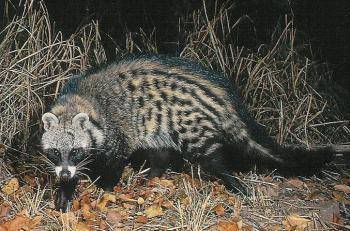|
|
Nak teka gakkkkkk....
Jawapannya adalah.... BANDICOOT......
hehehe...itupun sebab dulu minat gile main game Crash Bandicoot kat PS... |
Rate
-
1
View Rating Log
-
|
|
|
|
|
|
|
|
|
|
|
Reply #142 DocYana's post
hehehe... cepatnye jawab..
waa tahniah ko dapat jawab.. cecco pun dulu suka main game nii 

The eastern barred bandicoot only survives in Victoria and Tansmania. There is more of a population in Tansmania, in Victoria the only known population can be found in the western basalt plains. Over one hundred years ago the eastern barred bandicoot lived in southern Australia. Unfortunately the last known sighting that region was in 1893. Domestic animals such as cat and dogs have led to the endangerment of the eastern barred bandicoot as well as the clearing of the species natural habitat by humans. The eastern barred bandicoot is a nocturnal marsupial. This animal is highly flexible in terms of nesting sites, as long as the ground is densely covered and feeding sites are nearby. Cemeteries, gardens, parks, farms, and woodlands are all common. The nest itself is made of grass and usually found in bushes where there is plenty of shelter. Eastern barred bandicoots nest alone unless it is a female weaning her young.
[ Last edited by a.ceCCo at 7-7-2008 05:22 PM ] |
Rate
-
1
View Rating Log
-
|
|
|
|
|
|
|
|
|
|
|
Mana la Cecco korek semua binatang pelik2 nie.....
Jawapan dia ADDAX? |
Rate
-
1
View Rating Log
-
|
|
|
|
|
|
|
|
|
|
|
Reply #145 DocYana's post
hehehe... betul !!  
tahniah..

Addax nasomaculatus) is a critically endangered desert antelope that lives in several isolated regions in the Sahara desert. Although extremely rare in its native habitat, it is quite common in captivity and is regularly bred on ranches where they are hunted as trophies. There are less than 500 addax left in wild, with less than 860 in captivity.
The Addax stands about 1 metre tall at the shoulder and weighs 60 to 120 kilograms. Their coat is white but their chest, neck and head are mainly brown with a white patch over the bridge of the nose and another around the mouth. They have a scraggly beard and prominent red nostrils. During summer their coat is white and during winter it is brown. Horns, found on both males and females, have two twists and can reach 80 centimetres in females and 120 centimetres in males. The hooves are broad with flat soles and strong dewclaws to help them walk on soft sand.
Addax live in desert terrain where they eat grass, and leaves of what bushes there are. Addax don't drink, but get all the moisture they need from their food. Addax are nocturnal: they rest during the day in depressions they dig for themselves.
Addax herds contain both males and females and have from two to twenty animals, though they had more in previous times. They wander widely in search of food. Addax have a strong social structure, probably based on age, and herds are led by the oldest male. |
Rate
-
1
View Rating Log
-
|
|
|
|
|
|
|
|
|
|
|
lama tak bukak PC.. hohoho so busy lately.
nextttttt

apakah ia.?  |
|
|
|
|
|
|
|
|
|
|
|
Reply #147 a.ceCCo's post
cik ceco, xde klue ke?  |
|
|
|
|
|
|
|
|
|
|
|
Reply #147 a.ceCCo's post
ni senang... kat rumah mak boocik ada pernah nampak.
jawapannya CIVET CAT.
[ Last edited by boocik04 at 8-7-2008 03:54 PM ] |
Rate
-
1
View Rating Log
-
|
|
|
|
|
|
|
|
|
|
|
Reply #151 boocik04's post
heee... anda betul, tahniahhh!
cecco tak kasi klue sebab haiwan ni kat malaysia pun ada 
nak hadiah?? kali ni aku kasik coklat plak..

haa cepatla makan.. kang cair.. 
more about civet..

Civets are small, lithe-bodied, mostly arboreal mammals native to the tropics of Africa and Asia. Civet may also refer to the distinctive musk that is highly valued as a fragrance and stabilizing agent for perfume.  Both male and female civets produce the strong-smelling secretion, which is produced by the civet's perineal glands.. Both male and female civets produce the strong-smelling secretion, which is produced by the civet's perineal glands..
Civets have a broadly cat-like general appearance, though the muzzle is extended and often pointed, rather like an otter or a mongoose.They range in length from about 17 to 28 in (400 to 700 mm) (excludingtheir long tails) and in weight from about 3 to 10 lb (1 to 5 kg).
They breed year round, producing litters of 1-6 fully-furred babiesafter a gestation period of 60-81 days. Some species may have 2 littersper year. Civets are omnivorous, supplementing a meat diet (both hunted and scavenged) with fruit, eggs, and possibly roots.
Favoured habitats?? woodland, savanna, and mountain biomes and, tropical rainforest.... |
Rate
-
1
View Rating Log
-
|
|
|
|
|
|
|
|
|
|
|
Reply #156 a.ceCCo's post
|
|
|
|
|
|
|
|
|
|
|
Reply #154 firdaruddin's post
|
clue? haiwan ni bertelinga panjang la abang ooii |
|
|
|
|
|
|
|
|
|
|
|
Reply #155 a.ceCCo's post
|
|
|
|
|
|
|
|
|
|
|
Reply #153 a.ceCCo's post
ni joey, anak kanggaroo (agaknye le  ....) ....) |
Rate
-
1
View Rating Log
-
|
|
|
|
|
|
|
|
|
|
|
Reply #159 a.ceCCo's post
tima kasih... haku mmg suka membaca  . . |
|
|
|
|
|
|
|
|
|
| |
|